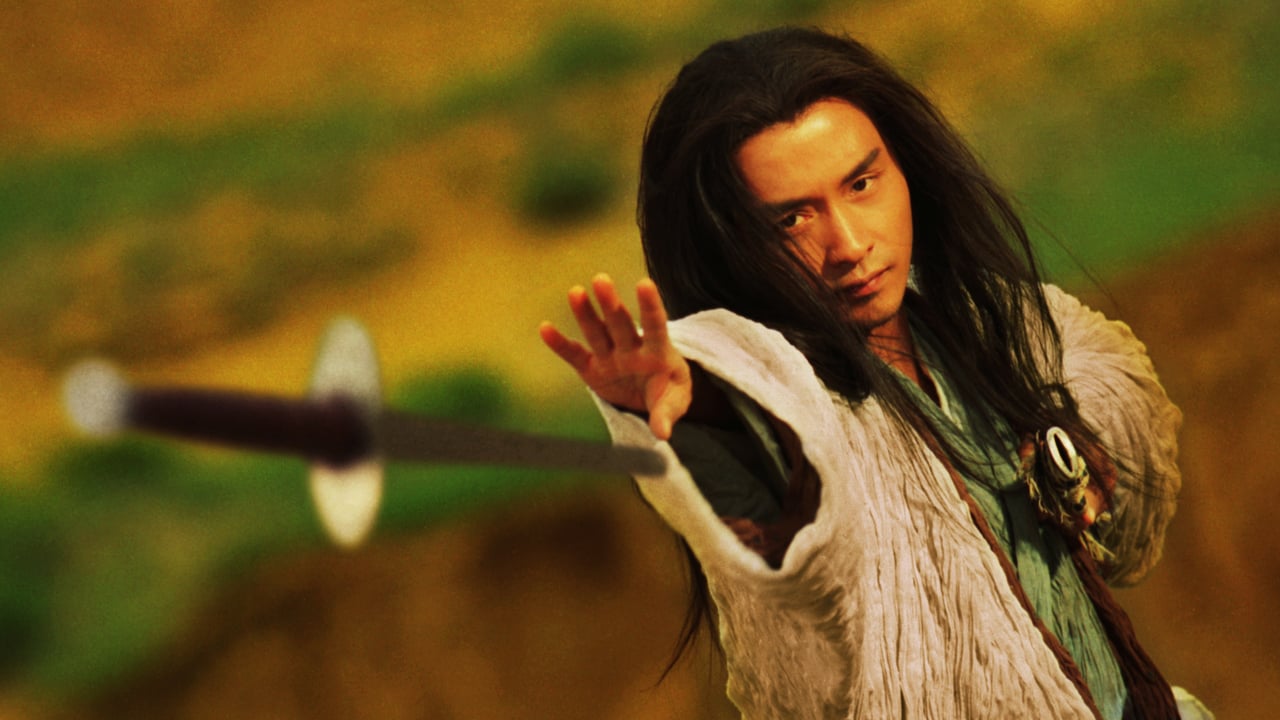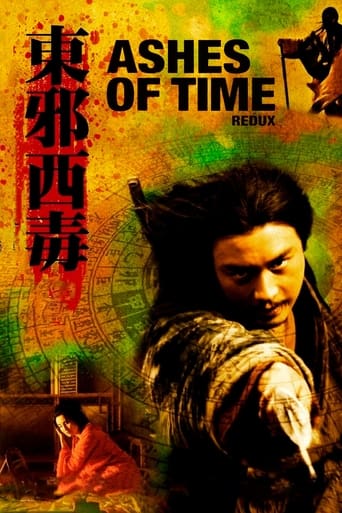



Self-important, over-dramatic, uninspired.
Excellent, Without a doubt!!
It’s not bad or unwatchable but despite the amplitude of the spectacle, the end result is underwhelming.
View MoreTrue to its essence, the characters remain on the same line and manage to entertain the viewer, each highlighting their own distinctive qualities or touches.
View MoreWong Kar-Wai takes a stab at the wuxia genre, with typically Wong-ish results. Stunningly gorgeous photography (and actors) by Chris Doyle, lots of slo-mo and atmospheric ambiance, and plenty of introspective voice-over. The fight scenes are brief, which is just as well since they're easily the worst parts of the film. Messy and confusing, one can imagine that Wong -- perhaps rightfully so -- didn't really care if the audience could follow the action. The plot is a bit confusing as well, with jumps in time and actors in dual roles, but I never felt too lost. The philosophical musings are also a bit too much like something from a fortune cookie... they sound good, but aren't really imparting any great wisdom. Like a lot of Wong, it traffics in a weightiness that its depth doesn't merit, but is so effective at establishing mood and tantalizing the senses that it feels like something special. Vaguely unsatisfying, yet entrancing.
View MoreNear the end, the proprietor of an inn perched on the windy edge of a sandy desert that stretches to the horizon has an epiphany; he has never before actually stopped to observe the desert, not as a transition, but as destination, as something that you don't calculate how to cross, but observe as a place you have crossed to reach. I have written the almost exact same idea (different setting) in one of my screenplays. This is the personal connection with a favourite film I value so much. Film becomes more than film, I see film as dream, a consciousness briefly shared then forgotten. It's that feeling of dreaming the same dream with a great artist that makes me tingle.This is a film like the best of novels, a web woven of fragmented image and word, drives and desires, rendered cinematically alive when the two coalesce to reveal yawning chasms of human experience, the one common shared human experience we all know. The film's opening serves as present tense and WKW builds fascinating removes from it to the point where the final story of the film climaxes in the past with shocking reverberations that make me rush through the entire film, clawing my way back to the present and previous past occurrences, to change my perspective.At the beginning of the film, a master swordsman arrives at an inn to offer the inn keeper a gulp from a wine that makes you forget the past. The inn keeper refuses. Throughout the film we happen upon characters, or characters happen upon the film as it passes time in that wind-torn inn by the desert, fixed in position by memory, by their inability or willinglessness to let go a human passion or folly, revenge or love however distant and impossible. We all need something to live for the inn keeper muses, and we know sometime we'll cling to the uglier most obsessive aspects of our nature to get us through the night. But this is all we have, not something to separate us from animals because even a dog will come to know the hand that strikes it, but all we have as humans to distinguish us from creation, being able to cling to that sad bitter memory of unfulfillment for years and make our unvanquished madness dear to us.This is all a bit of a game, life is through the remove of storytelling, it becomes myth and fabrication, but what wouldn't we give to go back and play it again. In the end we discover that the wine that makes you forget the past is regular wine and a character is only set free when he finds out his love, love he had and denied until he realized how precious it was to him and came back to find it gone, has died. But that was already two years ago and he's stood in place for those two years, allowing himself to be released from his selfimposed exile when a piece of paper reaches his hands, as though even absolution from guilt or shame or obligation can only properly come to pass in an official manner.WKW gives us swordplaying spectacle to go with this but he doesn't focus on it. Swords strike and fighters leap into the air in blurry shapes of color and motion yet the eye doesn't rest on the details of the fight but rather centers on facial expressions and the maddening ferocity of it all, like it's all a dance and we're dancing right in the middle of it. To say this is a wuxia is to set different expectations for it. Here poetry is not a poetry of appearances. As with his previous films, WKW tells us marvellous things about obsession and release, the yearning to remember and forget, and about letting ourselves go into new beginnings.
View MoreI am a Wong Kar Wai fan for years, and it took me a long time to finally get my hands on this movie. It's a beautiful and poetical movie. Yet, I didn't like it as much as the other Wong Kar Wai movies I have seen. Actors and characters are amazing, so is also the atmosphere and music. (Even though the music was not perfectly fitting in a few scenes.) The music often uses cheap synthesizer keyboard sounds. I personally like it, I can imagine though, that others dislike it.The thing that put me off the most have been the cuts. So many cuts have been plain bad. I don't actually get how this can happen to such a great director. The action scenes sucked almost every time. Often there have been several cuts in one second. But even in non-action scenes, stuff sometimes was cut too suddenly, and one scene didn't seem to fit to the other.Another problem for me has been the story. To me it seemed, that Wong had great and amazing ideas. Ideas that could have made a perfect movie. But he couldn't pull it off completely. This movie is full of great approaches, but somehow lacks the final "cut". The characters motivations couldn't convince me, and I found the episodic stories not perfectly connected to each others. Usually Wongs movies impress and move me totally. This time I have been quite entertained, but rarely impressed and moved. Some other movies of his I'd rate with 10 points. This one is not able to go above the 8 point mark.
View MoreMy own memory is scattered in the ashes of time, and I really need to re-view the original to see if my memory holds, but here is my impression. I'd give the original a 10. This one rates an 8. The two together are probably a 12.I personally didn't like the amped up color. I gather that one of the things that happened when the filmmaker rediscovered a warehouse full of bootlegs was that there were some terrible copies that distorted the color, and he liked and played with that. This version also seemed more static than I remember--a lot of shots seem to have been done with still or very short segments of film. I have to see the original again to see if that's really the case, or if it is just my memory that there were more frames of action in the original. This often felt like it was cut from snippets. For example, the shifting sands under the title was a pair of superimposed images moving in different directions. Was that the case originally as well?I loved the original but also could never quite follow the plot. Redux slices and dices (or-rather-unslices) so that each story is parceled together and the blurring that is going on in the interactions on-screen (for example, the Yin/Yang sibs) does not spill over quite as much into the interaction between viewer and screen. Redux shakes out the story lines so you can parse them. I miss the mystification, and don't think it's a net gain. I also think something else may be going on here... If you remember the original (or have a copy to view), tell me what you think of this reading: The point of view of the story seems to have shifted from Huang Yaoshi to Ouyang Feng--although because of how the movie mixes action, memory and stories it is hard to tell. In the original, we followed the wandering Huang as his memory unspooled. Part of the difficulty for a viewer in understanding was the difficulty that his point of view had, because he was moving through a world of consequences without his memory to root understanding. The story flowed in pieces which might have been his splintered memories-ashes of time- or might have been others'. Things that he is told by unreliable narrators are accepted at face value until experience tells him otherwise. Events are repeated in variation as his understanding of them waxes and wanes.In this version, the narrator (Huang Yaoshi) is fixed and the world comes to him. Things enacted in the first movie (for example, the encounter between Huang and Murong) with all the attendant ambiguity of living sequence, are instead recounted, with the flattening filters of narrator and listener. Unlike Huang, Ouyang accepts nothing at face value. So each event is more clearly arranged in a narrative, but all the narratives are filtered in the same way by a mind that rejects nuances that it can't fit to its particular ego. It is only at the end that Ouyang gains an insight that he may have missed things as important as his life's love as a result of his fear and pride.The story consists of interlocking circles,organized around male-female pairs. Ouyang and his true love are separated because of mutual pride and unwillingness to be the first to declare love; Huang plays messenger between them, never telling the woman his own love for her. This story of two men and a woman is mirrored in a minor key in another triangle which engages Huang. In this one, passion was realized with unhappy consequences for all. Huang seduced his best friend's bride. At the time of the story, the blind husband encounters the memoryless Huang. Just as the moment to tell love had gone by for the lovers in the first triangle, the moment to enact revenge has slipped past the rivals. The subsidiary stories also have evenly balanced male and female parts. The balance of male and female is concentrated to a point in Murong, who manifests that experience as a spinning latticed cage, sexual identity as a trap. Hong Qi, the natural, is steadfastly pursued by his wife, who ignores his rejection and simply acts to do what she thinks is right. The girl who wants revenge for her brother mirrors Ouyang. Each believes they have only one thing to sell, and each expects to be able to withhold the self from the exchange. For each, it takes another person's wound to break the trance of transactions. Whatever is going on Wong Kar Wai and Christopher Doyle are gods.
View More